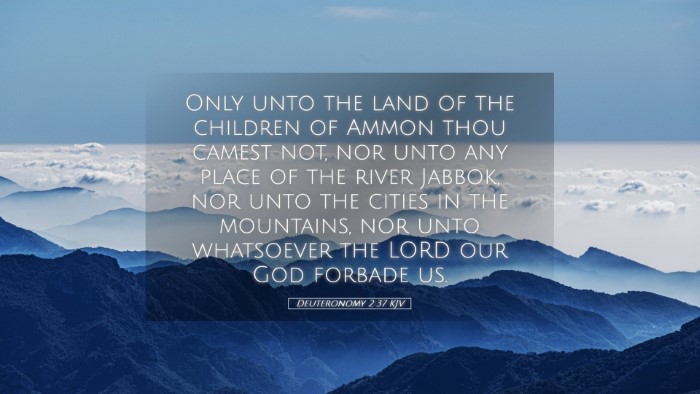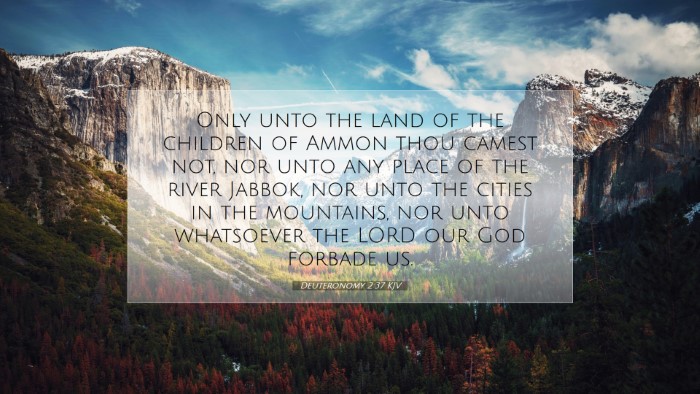Commentary on Deuteronomy 2:37
Bible Verse: "But unto the land of the children of Esau, which dwelleth in Seir, and unto the city of the wilderness, which is Kadesh, ye came not; nor into the land of the children of Ammon, which dwell in the land of the giants." (Deuteronomy 2:37)
Contextual Overview
The Book of Deuteronomy serves as a farewell address from Moses to the Israelites before they enter the Promised Land. It encapsulates the essence of their journey, emphasizing obedience, covenant, and the importance of remembrance. In this specific verse, Moses is recounting the boundaries and instructions for the Israelites as they navigate the lands of nations that the Lord commanded them not to disturb.
Insights from Matthew Henry
Matthew Henry highlights the significance of the specific nations mentioned in this text, particularly noting the descendants of Esau and Ammon. He explains that the Israelites were instructed to respect these lands and not provoke their inhabitants. Henry indicates that this demonstrates God's control over the lands and nations, emphasizing that the Israelites were to trust in God’s provision and guidance. The mention of the “land of the giants” serves as a reminder of the daunting challenges that lay ahead for the Israelites and the importance of faith in confronting them.
Insights from Albert Barnes
Albert Barnes further explains that this prohibition was rooted in the historical enmity and familial relationship between these nations and Israel. He notes that the descendants of Esau, the Edomites, were a significant distant kin of the Israelites, being descendants of Jacob’s brother. Barnes suggests that understanding these relationships sheds light on the moral obligation of respect and non-aggression that Israel was to uphold. Furthermore, he elaborates on the geographic and strategic implications of avoiding these lands as a means of fulfilling God’s command, which demonstrates God's divine oversight in leading Israel through the wilderness.
Insights from Adam Clarke
Adam Clarke focuses on the geographic specifics mentioned in Deuteronomy 2:37. He elaborates on the "wilderness," referring to Kadesh, highlighting that it was an area of significant events in Israel's history. Clarke emphasizes that Kadesh was the location of both promise and failure—it was where the Israelites were called to enter the Promised Land initially but faltered in faith. He also explores the deeper theological implications of this verse, encouraging believers to reflect on their own spiritual journeys and the importance of trusting God's directions, even in the face of seemingly insurmountable obstacles.
Theological Implications
This verse invites deeper theological reflection regarding God’s sovereignty in guiding His people through challenging terrains. The command to not disturb the lands of Esau and Ammon speaks not only of respect for the lands but also of the call to obedience. For pastors and theologians, this showcases a dichotomy between human ambition and divine provision—a reminder that spiritual success is not simply defined by conquest but by adherence to God’s commandments.
Practical Reflections for Ministry
- Obedience to Divine Guidance: Leaders are reminded to seek and adhere to God’s directives in ministry settings.
- Respect for Others: This passage raises important considerations regarding interrelations with other communities and authorities.
- Faith in Adversity: Confrontational faith amidst challenges echoes a foundational principle for spiritual resilience.
- Legacy and History: The recollection of Israel's journey underscores the importance of understanding history in the context of faith.
Conclusion
Deuteronomy 2:37 serves as a profound lesson on the interplay between divine command, human response, and the navigation of community relationships. By revisiting the insights of respected commentators like Matthew Henry, Albert Barnes, and Adam Clarke, modern readers are encouraged to delve deeper into the text, extracting timeless truths that resonate with contemporary faith journeys. The passage ultimately calls believers to a life characterized by obedience, respect for God's commands, and faith in His overarching plan.


